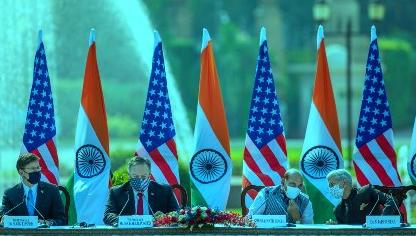Amid Tension with China, India & US Sign Intel-Sharing Agreement
By :
Notice: Trying to get property 'fName' of non-object in /home/u589520015/domains/observerdawn.com/public_html/module/Application/view/application/index/news.phtml on line 23
Notice: Trying to get property 'lName' of non-object in /home/u589520015/domains/observerdawn.com/public_html/module/Application/view/application/index/news.phtml on line 23

India
and the United States have signed a basic exchange and cooperation agreement
for geospatial cooperation, a major defense pact for the exchange of classified
geospatial intelligence between their armed forces.
The agreement was signed between the U.S.
National Geospatial-Intelligence Agency, which is part of the Defense
Department, and the Indian Ministry of Defence during the third 2+2 dialogue
between the defense and foreign ministers of the two counties.
India and the U.S. negotiated the terms
of the agreement for more than a decade, according to an MoD official. The
officials explained, “BECA will permit the U.S. armed forces to provide
advanced navigational aids and avionics and share geospatial intelligence to
India that will help boost the accuracy of the Indian military’s automated
hardware systems and weapons such as drones, cruise missiles and ballistic
missiles”.
The third round of the bilateral 2+2
meeting was held in India on Oct. 27 against the backdrop of a tense border
standoff with China in eastern Ladakh. In a joint statement the ministers —
Indian Defence Minister Rajnath Singh and Minister of External Affairs
Subramanyam Jaishankar, with U.S. Secretary of State Mike Pompeo and Defense
Secretary Mark Esper — described the pact as a significant step in bilateral
relations. The Defense Technology and Trade Initiative, meant to bolster the
joint production of weapon systems, was also discussed, and a bilateral summit
is planned later this year to strengthen defense industrial cooperation, the
joint statement noted. “We have identified priority near-term projects for
joint development between respective agencies, which need to be fast-tracked
under the DTTI and resolved to work together in defense [research and
development] more efficiently,” Singh said. India wants co-development and
co-production of defense technologies in areas related to cybersecurity;
military space; air-launched small unmanned systems; lightweight small arms;
ISTAR (intelligence, surveillance, target acquisition and reconnaissance)
aircraft; unmanned aerial systems; advanced artillery ammunition; and mortar
and rocket systems, according to another MoD official.
The two countries will also hold the inaugural
Industrial Security Annex summit later this year to further strengthen defense
industrial cooperation, the joint statement read. The annex, signed in December
2019, enables greater industry-to-industry collaboration for co-production and
co-development in the defense sector.
